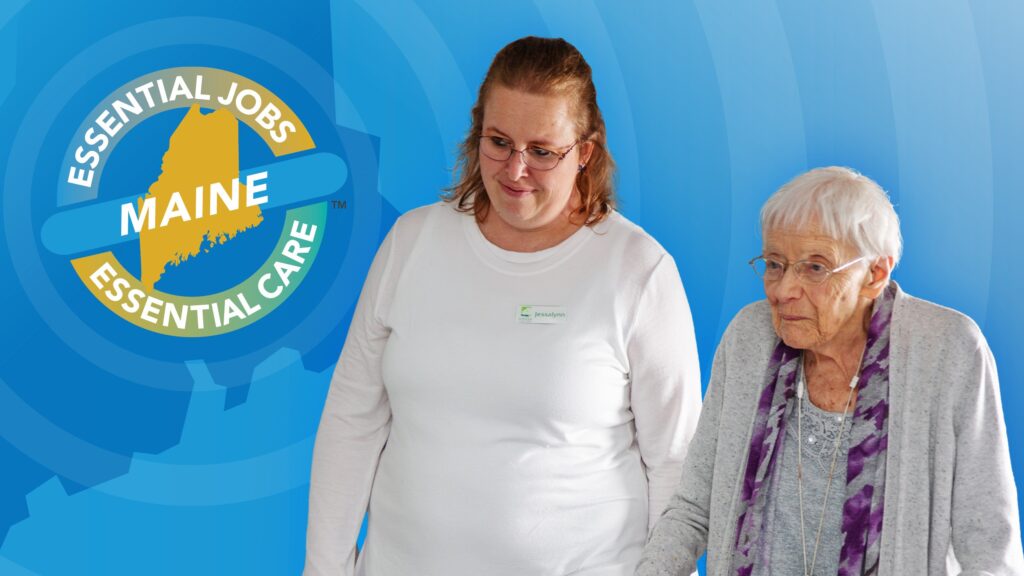Making the Math Work: Supporting Direct Care Workers in Maine

Last year, PHI began partnering with the Maine Council on Aging on Maine’s Essential Care & Support Workforce Partnership, which builds on the Council’s years of successful advocacy on behalf of direct care workers and the people they support. This partnership is part of PHI’s Essential Jobs, Essential Care™ state-based advocacy initiative, which has included Michigan, New Jersey, New Mexico, New York, and North Carolina. In each of these states, Essential Jobs, Essential Care is based on three main policy goals: improving compensation for direct care workers, driving workforce innovations (such as training and advanced roles), and strengthening workforce data collection.
PHI’s Senior State Policy Advocacy Specialist, Jake McDonald, spoke to Jess Maurer, executive director of the Maine Council on Aging, about how this initiative will impact Maine’s direct care workers and the essential services they provide for older adults and people with disabilities.
Jake McDonald: Tell me about the Maine Council on Aging.

Jess Maurer, Executive Director, Maine Council on Aging
Jess Maurer: We’re a broad, multi-disciplinary network of more than 130 organizations, municipalities, and businesses that work collectively to make sure we can live healthy, engaged, and secure lives in our homes and communities. Our members come from all segments of the economy, and we try to make sense of policy issues through the lens of aging. We just celebrated our tenth year.
Jake: What are some of the Council’s victories?
Jess: We’ve focused most on increasing wages for direct care workers. Ten years ago, we won the first wage raise for direct care workers in 15 years and we’ve been making incremental gains since then. We also helped create the Long-Term Care Workforce Commission, which issued a robust report [a comprehensive study of long-term care workforce issues in Maine]. We’ve been operationalizing the report’s recommendation of raising workers’ wages across the continuum of different kinds of direct care workers. Our biggest victory was establishing the labor portion of the MaineCare rates for all “essential support workers” at a minimum of 125% above minimum wage, which is far higher than the national wage.
Jake: Why is this work so important?
Jess: We’re the oldest state [demographically] in the country, the most rural state in the country, and we have the smallest working-age population in the country. So, if you look at some of our small communities, they have fewer than one working-aged woman [the typical demographic for direct care workers] for each person over age 65. This math doesn’t work. We don’t have enough workers to take care of the people who need care in this state. We’re going to need to do something drastic over the next five or six years to make real progress in growing this workforce. Not just keeping the workers well supported but increasing their numbers.
Jake: What have you done so far in Maine to increase the number of direct care workers?
Jess: Here in Maine, we are the first in the country to experience this tightening of the workforce because of our demographics. We’ve done a good job pushing as hard as we can to get more funding, more valuing of this workforce. We have gotten more free training, easier credentialing, career pathways, and tuition reimbursements. It’s helping us to keep our workforce, but we need to be in a place where we are growing our workforce.
Jake: Tell us about why you are leading Maine’s Essential Care & Support Workforce Partnership.
Jess: PHI’s index ranks Maine fourth in supporting direct care workers, which is great. But we see a growing gap between people who are entitled to receive care and those who are actually getting care. So, that tells us we don’t have a sufficient number of direct care workers. Ideally workers would have reliable work hours, be paid a competitive wage, be fully valued for the work they do, and have benefits like paid time off and paid family leave. That’s ideal for the workers and ideal for the people who are entitled to care who would gain access to quality, reliable, and affordable care.
Jake: What do you hope this initiative will do?
Jess: So, the goal of this three-year initiative is to increase the number and kinds of people who are engaged in the conversation around our growing shortage of direct care workers. And, in the advocacy effort, to move us towards building the capacity of the workforce to meet existing demand. We’re using PHI’s model of building an advocacy road map. The strategy is to show how direct care work is an important economic driver and, if the shortage continues, a barrier to economic growth. We’re working on reports with the Maine Center for Economic Policy and we’ll use these reports to leverage conversations to pass legislation. We want to drive new innovations in the field.
Learn more about PHI’s state advocacy initaitives here.






